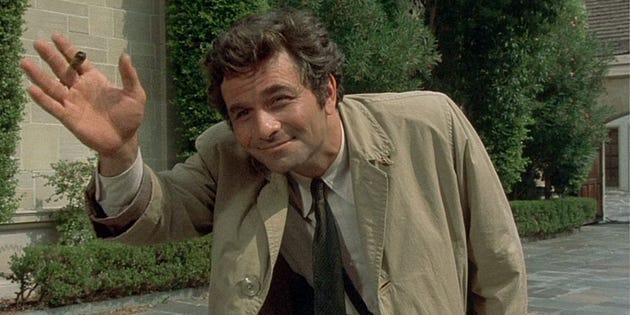Sherlock Holmes is an easy analogy to lean into when we discuss innovation. A problem is discovered, all the clues are there waiting to be assembled, step by logical step, into a coherent story. Once you arrive with ease at an explanation, your solution will fit perfectly with the facts.
An elegant solution will, in hindsight, be an obvious solution. All that is required is the right mind to gather the facts and put the puzzle together. My name is Innovator, and it is my business to know what other people don’t know.
However, I’ve changed my mind about which fictional detective we should imitate should we ever hope to innovate.
But before I offer an alternative, Holmes may yet offer us some clues on how we should behave should we wish to solve difficult problems with clever ideas.
We might wish to imitate Holmes, and yet Holmes and his imitators are not particularly agreeable characters. To accompany his fearless intelligence, Holmes is described as an eccentric, compulsive, single minded obsessive. Holmes is portrayed as arrogant and will exhibit derision to those who don’t possess his skill.
He may rebuff praise, but his willingness to allow the police to take credit for his work may simply be an act of egotism. Holmes has a flair for showmanship and will hold back his reasoning or perhaps provide cryptic hints until the case is resolved and he can explain all of his deductions at once.
This detective is moody, aloof, and emotionally guarded. A drug user with little regard for contemporary standards of tidiness or good order. Holmes will suffer bouts of mania and depression. He will display outbursts of passionate energy, followed by periods of lethargy, during which he will become easily bored.
At one moment, dispassionate and cold. However, when hot on the trail of a mystery he will display a remarkable passion. Holmes is attracted to danger with a willingness to bend the truth and break the law to achieve his goals. Some, more modern interpretations of Holmes suggest Holmes is either socially inept or simply uninterested in the social graces.
This modern character is impulsive, conceited, manipulative and may employ his intellect to inflict needless cruelty upon others. The numerous interpretations of the Sherlock Holmes story are often as much a study of the character of Holmes as it is a study of the mystery at hand. We are offered scrutiny of this character from the perspective of those who must endure Holmes’s eccentric behaviours.
If one is responsible for solving new problems with new ideas, is there anything that we can learn about how we should behave, not by observing Holmes himself, but by observing the world from Holmes’s perspective? How does this world appear to Holmes? We can’t simply assume that the backdrop upon which he performs his deductions is of no interest.
He prefers not to fill his mind with information that may disrupt his detections. However, Holmes observes everything. No detail will pass unnoticed. He surely sees the influence he has upon those around him. What does Holmes see?
Holmes sees people who need his help, but in payment must suffer his presence.
Observe how those around Holmes are disrupted and unsettled. Observe how his process and his conclusions are treated. An anomaly. A useful anomaly. Valuable even. But a value not to be enjoyed, but to be tolerated. Those around Holmes are intrigued, but exasperated.
The observations he makes and the conclusions he draws are designed to be accessible. His conclusions fit the facts that those around him can observe with their own eyes. That’s how Holmes works. So why the frustration from everyone present?
Those around Holmes are on occasion humiliated at their lack of insight. They may struggle to keep up with Holmes. However, perhaps they’re frustrated because they wish to apply a more familiar process from which they will find more familiar answers. They may even believe that they have the answer already, before they give Holmes a call.
Holmes doesn’t seem to care. In fact, perhaps Holmes needs this emotional detachment to perform his deductions. Perhaps he can’t care about their feelings if he wishes to solve the case.
A derivative of Holmes, Dr Gregory House, explicitly requires his pain to provide the focus to perform medical miracles. And with this necessary pain comes the inevitable impact upon his personality and upon his relationships with others.
Perhaps those around House, who must endure his eccentric disruptions, suffer his behaviours because they recognise the value that he offers and seek it for themselves.
Those around Gregory House who wish to perform the same miracles have a choice. Achieve as House does, but lose your humanity as House has.
In fact, is the treatment of Holmes as an eccentric, disruptive, irritating crackpot when he discovers a fruitful line of inquiry offered as an objective perspective of Holmes from these supporting characters? Or is the manner in which we see Holmes treated actually an observation made by Holmes of their reaction to his disruption?
Sherlock Holmes is an easy analogy to lean into when discussing innovation, because if you must discover novel solutions to difficult problems, the behaviour of those around Holmes may be all too familiar.
In the early stages of an innovation exercise, information will be scarce. So, unlike Holmes, deductions are likely to be messy, disruptive, confrontational, and hopelessly incomplete.
Holmes doesn’t seem to care about the opinions of others. However, for those of us who do not possess the genius of Holmes, nor his reputation, we may have to care.
We can’t just solve the problem. We may also have to care about the reaction of others to our disruptive influence. We must be more subtle than Holmes’s bombastic showmanship if we are to get any further than the merest genesis of an idea.
We might hope to imitate Holmes, but perhaps Holmes is not a conceit that we can afford.
Despite being an agreeable fantasy to compensate for the less fulfilling outcomes we find when we disrupt familiar, ordered processes, procedures and product lines, what could Holmes’s behaviour teach us about innovation?
About the discovery of novel solutions to difficult problems?
About getting others on board with our ideas?
How might Holmes exercise his unique skills, whilst inevitably disrupting those around him, but without drawing their derision?
Perhaps we could remember that in the early days of the disruption that innovation brings, we have no answers. Unlike Holmes, our efforts must be framed not as solutions, but as questions.
If Holmes would ask those around him the questions that he asks himself, perhaps he could provoke them to observe the world around them as keenly as he. If they can see the world as Holmes can see it, perhaps they could conclude what Holmes has already concluded.
Under these circumstances, they might own those conclusions rather than be forced to endure the discomfort of thinking outside their own particular little box.
Perhaps this more collaborative approach suggests that we’re looking to the wrong detective to offer support for our disruptive ideas.
Consider a friendly and dishevelled homicide cop who shuffles into the room. This unkempt detective adopts a manner so inelegant and disarming that you may be fooled into assuming a certain ineptitude.
The focus of the conversation ebbs and flows, drifts from the topic at hand, but often comes back to the point. Apparently unnecessary details and seemingly irrelevant remarks cause a delay in getting to the point. This detective talks at length about irrelevant and trivial details.
Lieutenant Frank Columbo is not drawing his evidence from the inanimate world around him, but from the testimony of the perpetrators.
This shrewd detective often knows precisely who the perpetrator is the moment he enters the drama, but does not immediately reveal his hand.
Columbo lures the killer into a false sense of security. His dissembling is designed to encourage people to collaborate in their own fate. To own Columbo’s line of inquiry.
The perpetrator becomes increasingly unsettled as Columbo’s superficial pestering teases out incriminating evidence. Columbo solves the case by sifting through contradictions between the truth and the version of events presented to him by the guilty.
His relentless approach often leads the killer to offer so much information that they inadvertently incriminate themselves. Ultimately, Columbo need not accuse anyone, for the guilty are often cornered into a confession.
When faced with interesting new problems that demand innovative new answers, it’s very tempting to race others to a discovery, to secure that all important credit that innovators crave.
But if we race ahead, we’ll disrupt our audience.
Like Holmes racing to the next clue, we force others to keep up. But if we take our time, and if we could ask more questions rather than force upon others our disruptive answers, then perhaps we could allow others the opportunity to run with us.
And if those around us do indeed come to the conclusions that we may have already arrived at some time ago, they’ll own this conclusion.
But nothing is ever secured without some cost. We’re going to have to pay for this somehow.
If we follow Lieutenant Columbo’s lead and feed those around us with the observations they require to deduce our conclusions for themselves, they’ll believe in this solution.
In fact, they may believe in this solution so strongly that they may even believe that this satisfactory outcome was their idea all along.
And that is galling.
Great Ideas Should Be Disposable
My brother is quite different to me. He is an artist. Always has been. From an early age he had a practised eye and a deft hand. When we were growing up my brother would draw and paint, while I took household objects apart and never reassembled them.






